Annotated Bibliography: Scholarly Business Communication, BUS7300
VerifiedAdded on 2023/06/10
|9
|2156
|407
Homework Assignment
AI Summary
This annotated bibliography, created for a BUS7300 assignment, meticulously examines five scholarly articles focused on leadership styles and their effects on organizational performance. The bibliography includes detailed summaries of each article, highlighting the authors' hypotheses, methodologies, and conclusions. It explores the impact of transformational and servant leadership on organizational outcomes, delving into topics such as employee engagement, organizational learning, and innovation. The analysis also considers the moderating role of organizational size and the influence of leadership on change management. Each entry follows the required annotated bibliography format, including evaluations of the articles and the identification of limitations. The assignment emphasizes the importance of leadership in fostering effective communication and driving positive business outcomes. The articles analyzed cover a range of business sectors, including service industries and manufacturing, and provide insights into the dynamic interplay between leadership, organizational behavior, and overall success.
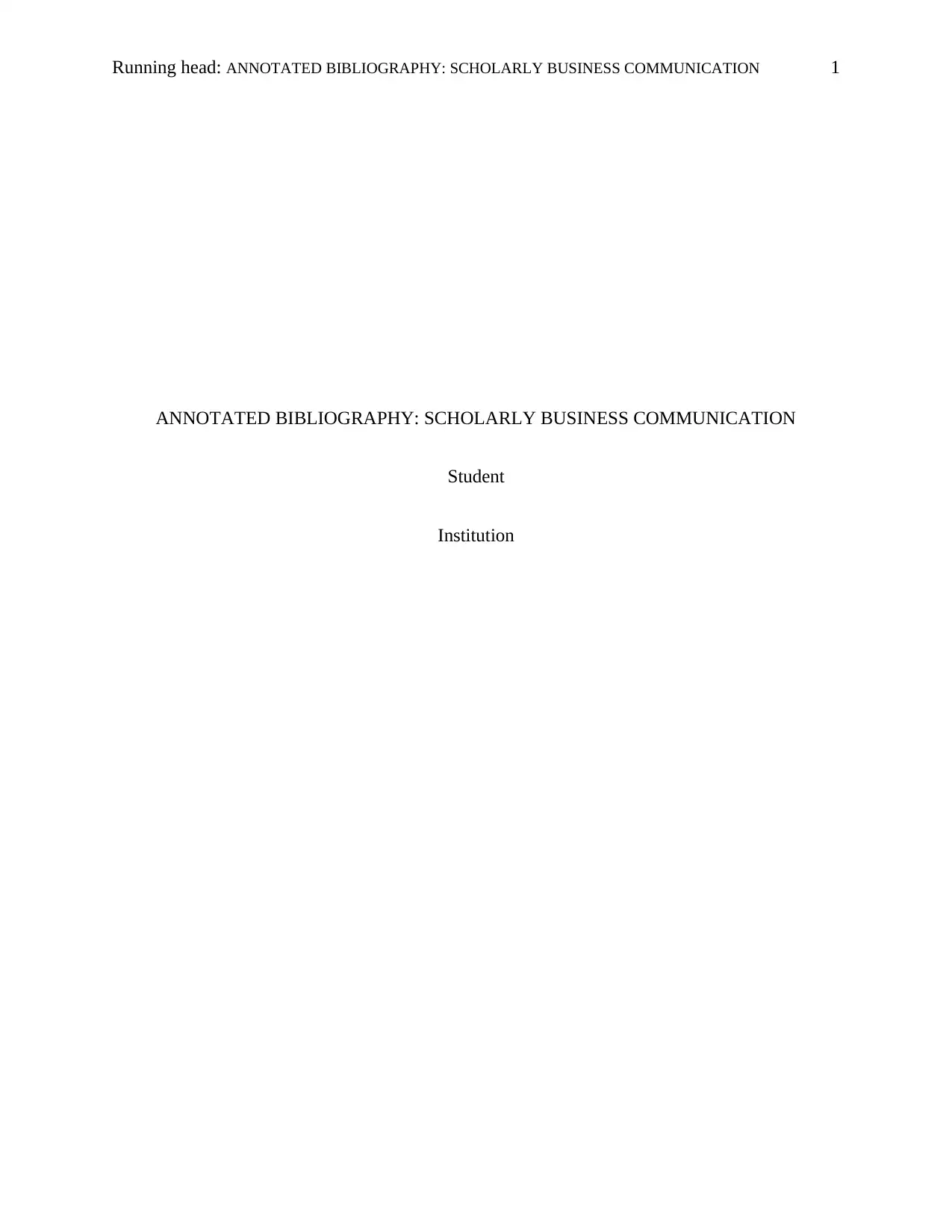
Running head: ANNOTATED BIBLIOGRAPHY: SCHOLARLY BUSINESS COMMUNICATION 1
ANNOTATED BIBLIOGRAPHY: SCHOLARLY BUSINESS COMMUNICATION
Student
Institution
ANNOTATED BIBLIOGRAPHY: SCHOLARLY BUSINESS COMMUNICATION
Student
Institution
Paraphrase This Document
Need a fresh take? Get an instant paraphrase of this document with our AI Paraphraser
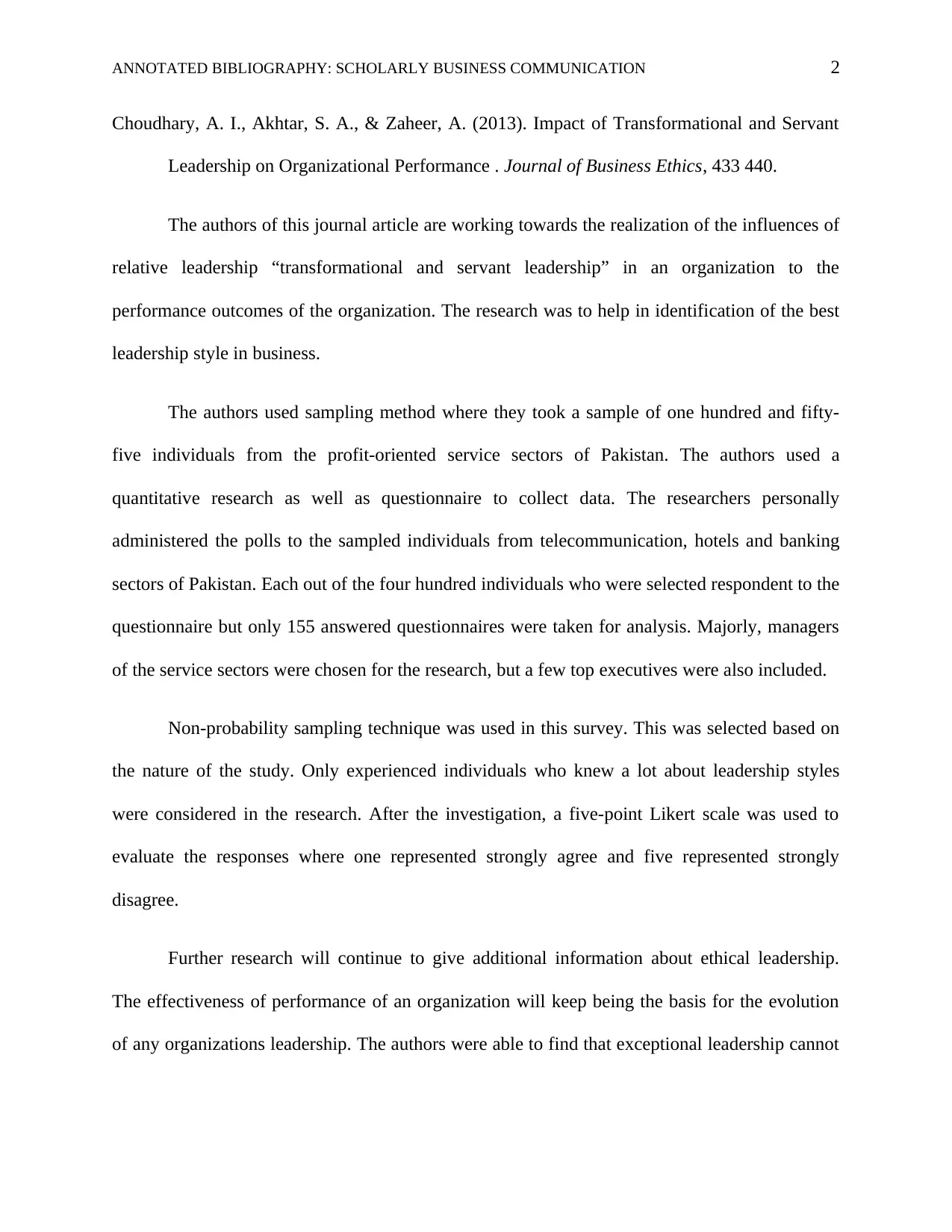
ANNOTATED BIBLIOGRAPHY: SCHOLARLY BUSINESS COMMUNICATION 2
Choudhary, A. I., Akhtar, S. A., & Zaheer, A. (2013). Impact of Transformational and Servant
Leadership on Organizational Performance . Journal of Business Ethics, 433 440.
The authors of this journal article are working towards the realization of the influences of
relative leadership “transformational and servant leadership” in an organization to the
performance outcomes of the organization. The research was to help in identification of the best
leadership style in business.
The authors used sampling method where they took a sample of one hundred and fifty-
five individuals from the profit-oriented service sectors of Pakistan. The authors used a
quantitative research as well as questionnaire to collect data. The researchers personally
administered the polls to the sampled individuals from telecommunication, hotels and banking
sectors of Pakistan. Each out of the four hundred individuals who were selected respondent to the
questionnaire but only 155 answered questionnaires were taken for analysis. Majorly, managers
of the service sectors were chosen for the research, but a few top executives were also included.
Non-probability sampling technique was used in this survey. This was selected based on
the nature of the study. Only experienced individuals who knew a lot about leadership styles
were considered in the research. After the investigation, a five-point Likert scale was used to
evaluate the responses where one represented strongly agree and five represented strongly
disagree.
Further research will continue to give additional information about ethical leadership.
The effectiveness of performance of an organization will keep being the basis for the evolution
of any organizations leadership. The authors were able to find that exceptional leadership cannot
Choudhary, A. I., Akhtar, S. A., & Zaheer, A. (2013). Impact of Transformational and Servant
Leadership on Organizational Performance . Journal of Business Ethics, 433 440.
The authors of this journal article are working towards the realization of the influences of
relative leadership “transformational and servant leadership” in an organization to the
performance outcomes of the organization. The research was to help in identification of the best
leadership style in business.
The authors used sampling method where they took a sample of one hundred and fifty-
five individuals from the profit-oriented service sectors of Pakistan. The authors used a
quantitative research as well as questionnaire to collect data. The researchers personally
administered the polls to the sampled individuals from telecommunication, hotels and banking
sectors of Pakistan. Each out of the four hundred individuals who were selected respondent to the
questionnaire but only 155 answered questionnaires were taken for analysis. Majorly, managers
of the service sectors were chosen for the research, but a few top executives were also included.
Non-probability sampling technique was used in this survey. This was selected based on
the nature of the study. Only experienced individuals who knew a lot about leadership styles
were considered in the research. After the investigation, a five-point Likert scale was used to
evaluate the responses where one represented strongly agree and five represented strongly
disagree.
Further research will continue to give additional information about ethical leadership.
The effectiveness of performance of an organization will keep being the basis for the evolution
of any organizations leadership. The authors were able to find that exceptional leadership cannot
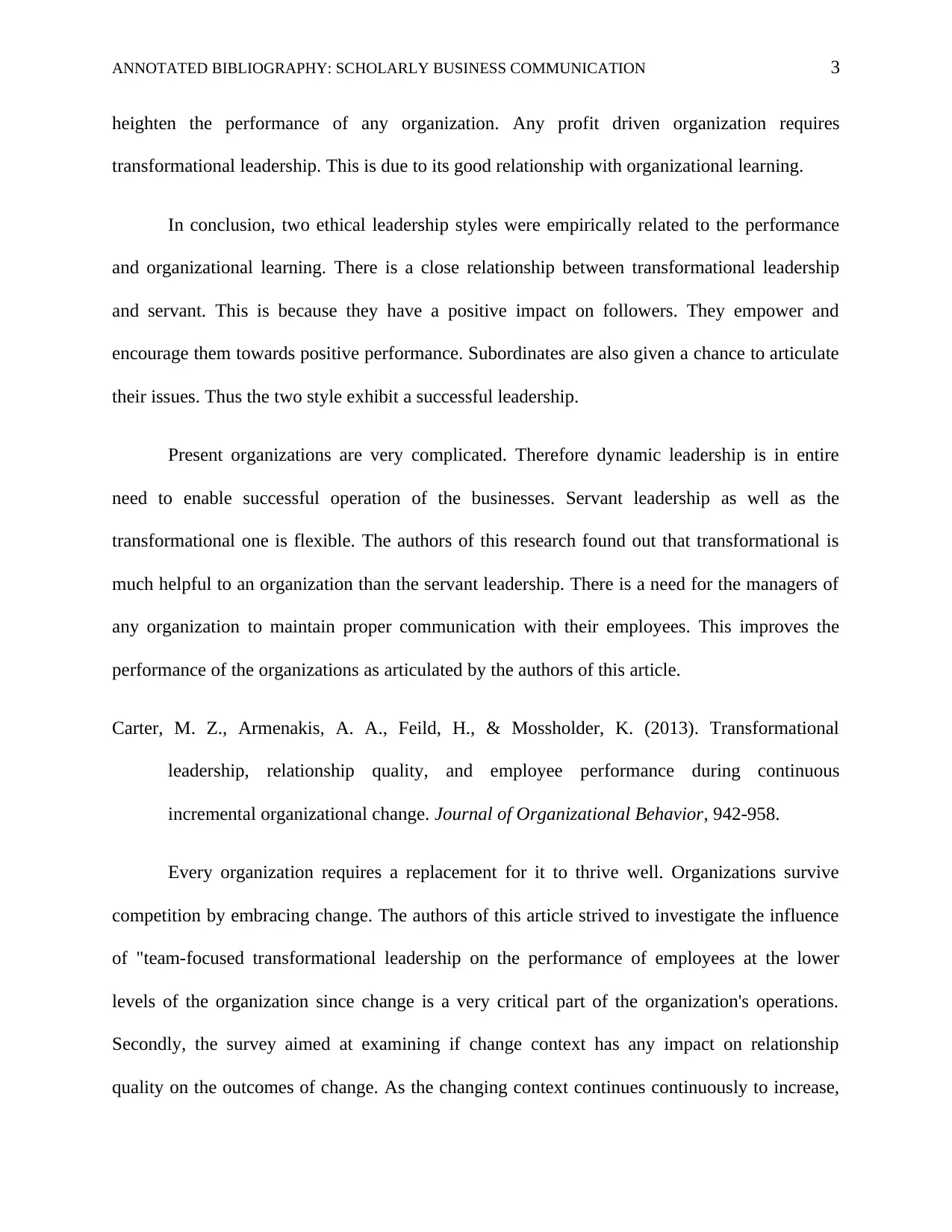
ANNOTATED BIBLIOGRAPHY: SCHOLARLY BUSINESS COMMUNICATION 3
heighten the performance of any organization. Any profit driven organization requires
transformational leadership. This is due to its good relationship with organizational learning.
In conclusion, two ethical leadership styles were empirically related to the performance
and organizational learning. There is a close relationship between transformational leadership
and servant. This is because they have a positive impact on followers. They empower and
encourage them towards positive performance. Subordinates are also given a chance to articulate
their issues. Thus the two style exhibit a successful leadership.
Present organizations are very complicated. Therefore dynamic leadership is in entire
need to enable successful operation of the businesses. Servant leadership as well as the
transformational one is flexible. The authors of this research found out that transformational is
much helpful to an organization than the servant leadership. There is a need for the managers of
any organization to maintain proper communication with their employees. This improves the
performance of the organizations as articulated by the authors of this article.
Carter, M. Z., Armenakis, A. A., Feild, H., & Mossholder, K. (2013). Transformational
leadership, relationship quality, and employee performance during continuous
incremental organizational change. Journal of Organizational Behavior, 942-958.
Every organization requires a replacement for it to thrive well. Organizations survive
competition by embracing change. The authors of this article strived to investigate the influence
of "team-focused transformational leadership on the performance of employees at the lower
levels of the organization since change is a very critical part of the organization's operations.
Secondly, the survey aimed at examining if change context has any impact on relationship
quality on the outcomes of change. As the changing context continues continuously to increase,
heighten the performance of any organization. Any profit driven organization requires
transformational leadership. This is due to its good relationship with organizational learning.
In conclusion, two ethical leadership styles were empirically related to the performance
and organizational learning. There is a close relationship between transformational leadership
and servant. This is because they have a positive impact on followers. They empower and
encourage them towards positive performance. Subordinates are also given a chance to articulate
their issues. Thus the two style exhibit a successful leadership.
Present organizations are very complicated. Therefore dynamic leadership is in entire
need to enable successful operation of the businesses. Servant leadership as well as the
transformational one is flexible. The authors of this research found out that transformational is
much helpful to an organization than the servant leadership. There is a need for the managers of
any organization to maintain proper communication with their employees. This improves the
performance of the organizations as articulated by the authors of this article.
Carter, M. Z., Armenakis, A. A., Feild, H., & Mossholder, K. (2013). Transformational
leadership, relationship quality, and employee performance during continuous
incremental organizational change. Journal of Organizational Behavior, 942-958.
Every organization requires a replacement for it to thrive well. Organizations survive
competition by embracing change. The authors of this article strived to investigate the influence
of "team-focused transformational leadership on the performance of employees at the lower
levels of the organization since change is a very critical part of the organization's operations.
Secondly, the survey aimed at examining if change context has any impact on relationship
quality on the outcomes of change. As the changing context continues continuously to increase,
⊘ This is a preview!⊘
Do you want full access?
Subscribe today to unlock all pages.

Trusted by 1+ million students worldwide
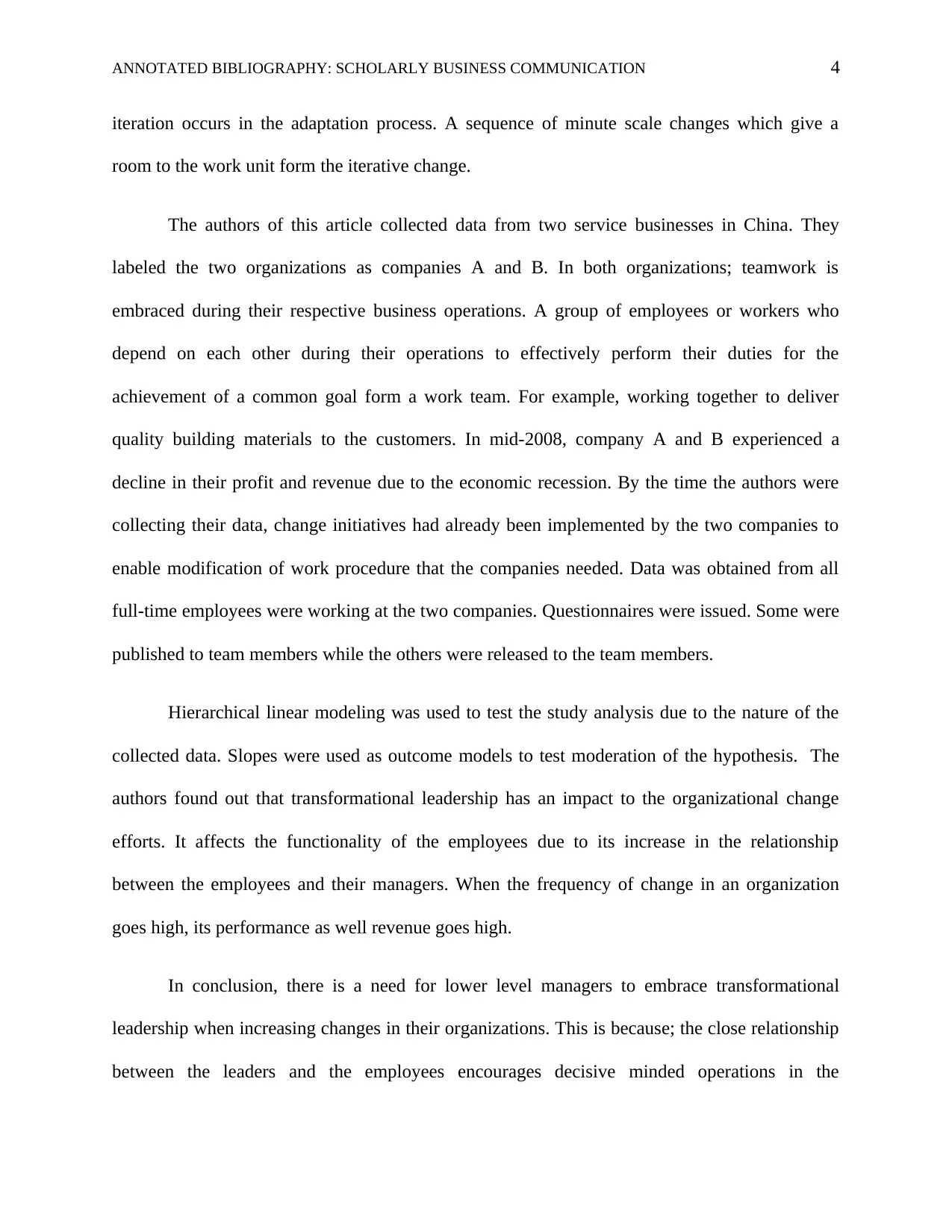
ANNOTATED BIBLIOGRAPHY: SCHOLARLY BUSINESS COMMUNICATION 4
iteration occurs in the adaptation process. A sequence of minute scale changes which give a
room to the work unit form the iterative change.
The authors of this article collected data from two service businesses in China. They
labeled the two organizations as companies A and B. In both organizations; teamwork is
embraced during their respective business operations. A group of employees or workers who
depend on each other during their operations to effectively perform their duties for the
achievement of a common goal form a work team. For example, working together to deliver
quality building materials to the customers. In mid-2008, company A and B experienced a
decline in their profit and revenue due to the economic recession. By the time the authors were
collecting their data, change initiatives had already been implemented by the two companies to
enable modification of work procedure that the companies needed. Data was obtained from all
full-time employees were working at the two companies. Questionnaires were issued. Some were
published to team members while the others were released to the team members.
Hierarchical linear modeling was used to test the study analysis due to the nature of the
collected data. Slopes were used as outcome models to test moderation of the hypothesis. The
authors found out that transformational leadership has an impact to the organizational change
efforts. It affects the functionality of the employees due to its increase in the relationship
between the employees and their managers. When the frequency of change in an organization
goes high, its performance as well revenue goes high.
In conclusion, there is a need for lower level managers to embrace transformational
leadership when increasing changes in their organizations. This is because; the close relationship
between the leaders and the employees encourages decisive minded operations in the
iteration occurs in the adaptation process. A sequence of minute scale changes which give a
room to the work unit form the iterative change.
The authors of this article collected data from two service businesses in China. They
labeled the two organizations as companies A and B. In both organizations; teamwork is
embraced during their respective business operations. A group of employees or workers who
depend on each other during their operations to effectively perform their duties for the
achievement of a common goal form a work team. For example, working together to deliver
quality building materials to the customers. In mid-2008, company A and B experienced a
decline in their profit and revenue due to the economic recession. By the time the authors were
collecting their data, change initiatives had already been implemented by the two companies to
enable modification of work procedure that the companies needed. Data was obtained from all
full-time employees were working at the two companies. Questionnaires were issued. Some were
published to team members while the others were released to the team members.
Hierarchical linear modeling was used to test the study analysis due to the nature of the
collected data. Slopes were used as outcome models to test moderation of the hypothesis. The
authors found out that transformational leadership has an impact to the organizational change
efforts. It affects the functionality of the employees due to its increase in the relationship
between the employees and their managers. When the frequency of change in an organization
goes high, its performance as well revenue goes high.
In conclusion, there is a need for lower level managers to embrace transformational
leadership when increasing changes in their organizations. This is because; the close relationship
between the leaders and the employees encourages decisive minded operations in the
Paraphrase This Document
Need a fresh take? Get an instant paraphrase of this document with our AI Paraphraser
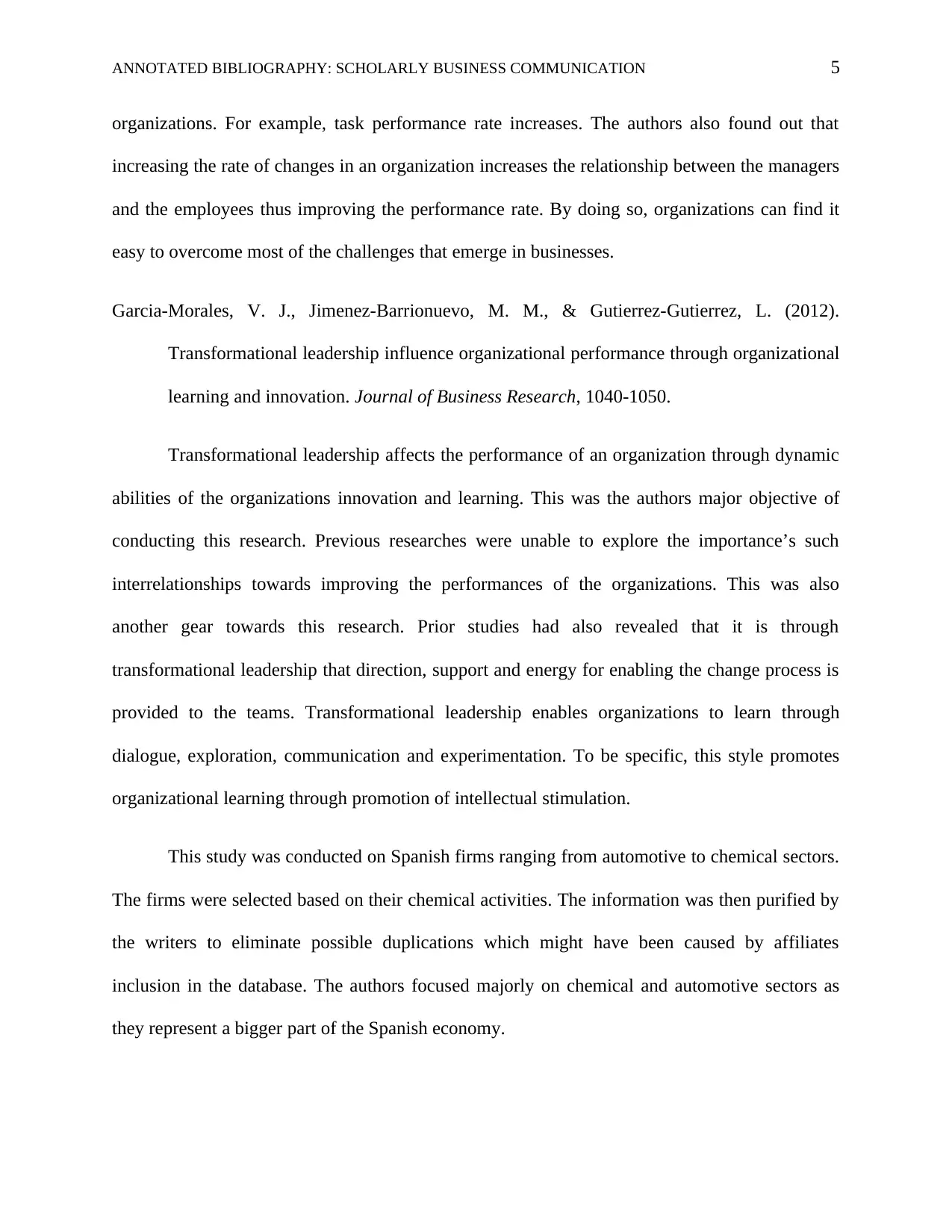
ANNOTATED BIBLIOGRAPHY: SCHOLARLY BUSINESS COMMUNICATION 5
organizations. For example, task performance rate increases. The authors also found out that
increasing the rate of changes in an organization increases the relationship between the managers
and the employees thus improving the performance rate. By doing so, organizations can find it
easy to overcome most of the challenges that emerge in businesses.
Garcia-Morales, V. J., Jimenez-Barrionuevo, M. M., & Gutierrez-Gutierrez, L. (2012).
Transformational leadership influence organizational performance through organizational
learning and innovation. Journal of Business Research, 1040-1050.
Transformational leadership affects the performance of an organization through dynamic
abilities of the organizations innovation and learning. This was the authors major objective of
conducting this research. Previous researches were unable to explore the importance’s such
interrelationships towards improving the performances of the organizations. This was also
another gear towards this research. Prior studies had also revealed that it is through
transformational leadership that direction, support and energy for enabling the change process is
provided to the teams. Transformational leadership enables organizations to learn through
dialogue, exploration, communication and experimentation. To be specific, this style promotes
organizational learning through promotion of intellectual stimulation.
This study was conducted on Spanish firms ranging from automotive to chemical sectors.
The firms were selected based on their chemical activities. The information was then purified by
the writers to eliminate possible duplications which might have been caused by affiliates
inclusion in the database. The authors focused majorly on chemical and automotive sectors as
they represent a bigger part of the Spanish economy.
organizations. For example, task performance rate increases. The authors also found out that
increasing the rate of changes in an organization increases the relationship between the managers
and the employees thus improving the performance rate. By doing so, organizations can find it
easy to overcome most of the challenges that emerge in businesses.
Garcia-Morales, V. J., Jimenez-Barrionuevo, M. M., & Gutierrez-Gutierrez, L. (2012).
Transformational leadership influence organizational performance through organizational
learning and innovation. Journal of Business Research, 1040-1050.
Transformational leadership affects the performance of an organization through dynamic
abilities of the organizations innovation and learning. This was the authors major objective of
conducting this research. Previous researches were unable to explore the importance’s such
interrelationships towards improving the performances of the organizations. This was also
another gear towards this research. Prior studies had also revealed that it is through
transformational leadership that direction, support and energy for enabling the change process is
provided to the teams. Transformational leadership enables organizations to learn through
dialogue, exploration, communication and experimentation. To be specific, this style promotes
organizational learning through promotion of intellectual stimulation.
This study was conducted on Spanish firms ranging from automotive to chemical sectors.
The firms were selected based on their chemical activities. The information was then purified by
the writers to eliminate possible duplications which might have been caused by affiliates
inclusion in the database. The authors focused majorly on chemical and automotive sectors as
they represent a bigger part of the Spanish economy.
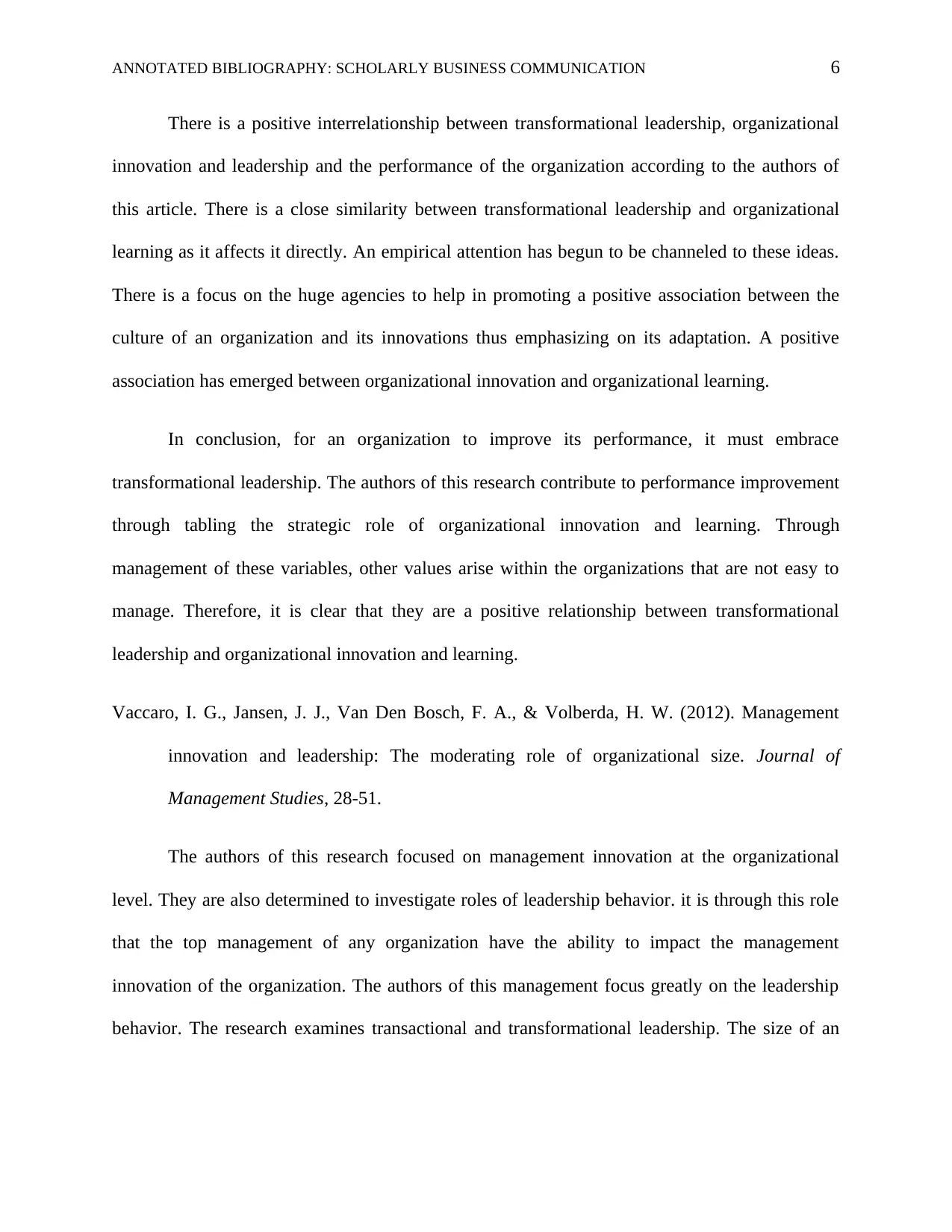
ANNOTATED BIBLIOGRAPHY: SCHOLARLY BUSINESS COMMUNICATION 6
There is a positive interrelationship between transformational leadership, organizational
innovation and leadership and the performance of the organization according to the authors of
this article. There is a close similarity between transformational leadership and organizational
learning as it affects it directly. An empirical attention has begun to be channeled to these ideas.
There is a focus on the huge agencies to help in promoting a positive association between the
culture of an organization and its innovations thus emphasizing on its adaptation. A positive
association has emerged between organizational innovation and organizational learning.
In conclusion, for an organization to improve its performance, it must embrace
transformational leadership. The authors of this research contribute to performance improvement
through tabling the strategic role of organizational innovation and learning. Through
management of these variables, other values arise within the organizations that are not easy to
manage. Therefore, it is clear that they are a positive relationship between transformational
leadership and organizational innovation and learning.
Vaccaro, I. G., Jansen, J. J., Van Den Bosch, F. A., & Volberda, H. W. (2012). Management
innovation and leadership: The moderating role of organizational size. Journal of
Management Studies, 28-51.
The authors of this research focused on management innovation at the organizational
level. They are also determined to investigate roles of leadership behavior. it is through this role
that the top management of any organization have the ability to impact the management
innovation of the organization. The authors of this management focus greatly on the leadership
behavior. The research examines transactional and transformational leadership. The size of an
There is a positive interrelationship between transformational leadership, organizational
innovation and leadership and the performance of the organization according to the authors of
this article. There is a close similarity between transformational leadership and organizational
learning as it affects it directly. An empirical attention has begun to be channeled to these ideas.
There is a focus on the huge agencies to help in promoting a positive association between the
culture of an organization and its innovations thus emphasizing on its adaptation. A positive
association has emerged between organizational innovation and organizational learning.
In conclusion, for an organization to improve its performance, it must embrace
transformational leadership. The authors of this research contribute to performance improvement
through tabling the strategic role of organizational innovation and learning. Through
management of these variables, other values arise within the organizations that are not easy to
manage. Therefore, it is clear that they are a positive relationship between transformational
leadership and organizational innovation and learning.
Vaccaro, I. G., Jansen, J. J., Van Den Bosch, F. A., & Volberda, H. W. (2012). Management
innovation and leadership: The moderating role of organizational size. Journal of
Management Studies, 28-51.
The authors of this research focused on management innovation at the organizational
level. They are also determined to investigate roles of leadership behavior. it is through this role
that the top management of any organization have the ability to impact the management
innovation of the organization. The authors of this management focus greatly on the leadership
behavior. The research examines transactional and transformational leadership. The size of an
⊘ This is a preview!⊘
Do you want full access?
Subscribe today to unlock all pages.

Trusted by 1+ million students worldwide
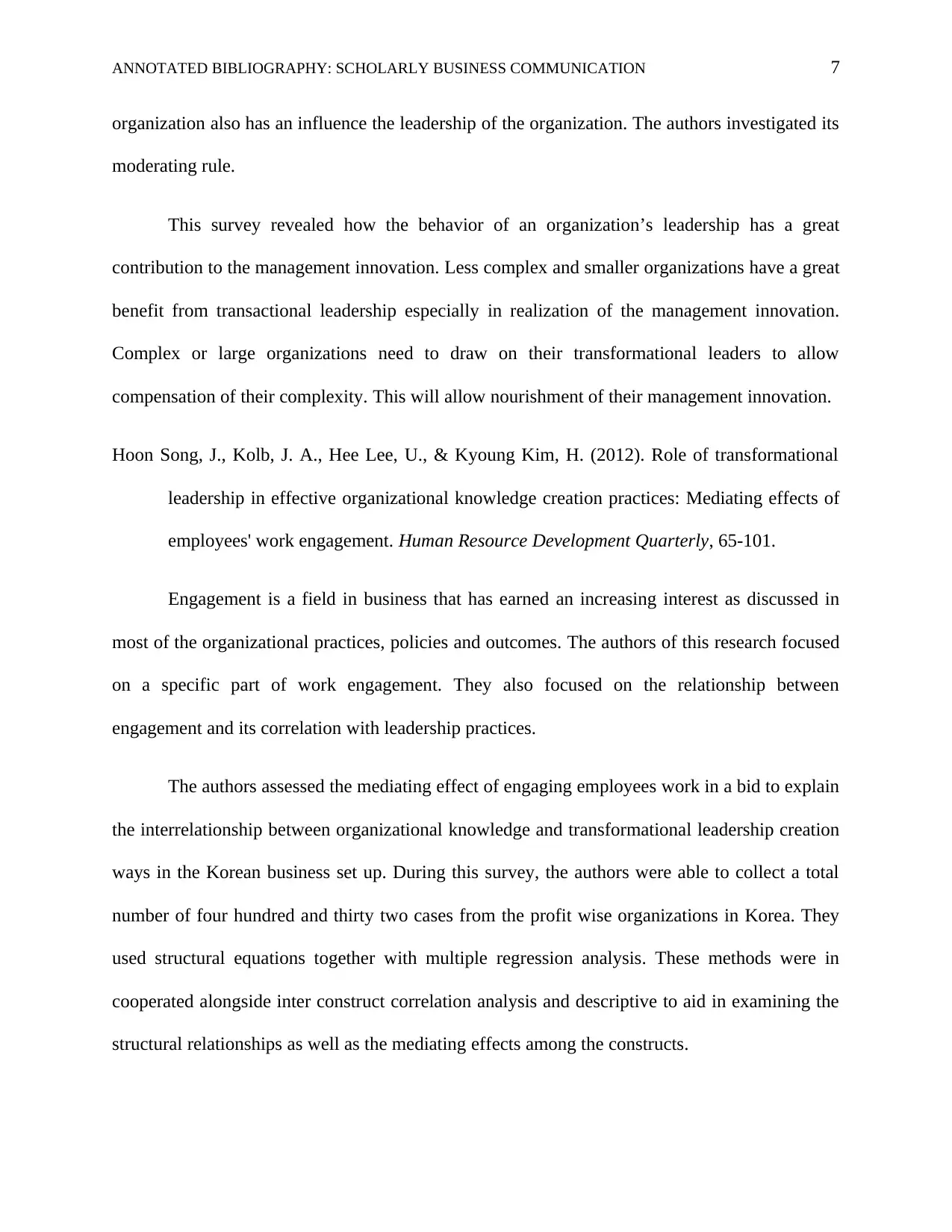
ANNOTATED BIBLIOGRAPHY: SCHOLARLY BUSINESS COMMUNICATION 7
organization also has an influence the leadership of the organization. The authors investigated its
moderating rule.
This survey revealed how the behavior of an organization’s leadership has a great
contribution to the management innovation. Less complex and smaller organizations have a great
benefit from transactional leadership especially in realization of the management innovation.
Complex or large organizations need to draw on their transformational leaders to allow
compensation of their complexity. This will allow nourishment of their management innovation.
Hoon Song, J., Kolb, J. A., Hee Lee, U., & Kyoung Kim, H. (2012). Role of transformational
leadership in effective organizational knowledge creation practices: Mediating effects of
employees' work engagement. Human Resource Development Quarterly, 65-101.
Engagement is a field in business that has earned an increasing interest as discussed in
most of the organizational practices, policies and outcomes. The authors of this research focused
on a specific part of work engagement. They also focused on the relationship between
engagement and its correlation with leadership practices.
The authors assessed the mediating effect of engaging employees work in a bid to explain
the interrelationship between organizational knowledge and transformational leadership creation
ways in the Korean business set up. During this survey, the authors were able to collect a total
number of four hundred and thirty two cases from the profit wise organizations in Korea. They
used structural equations together with multiple regression analysis. These methods were in
cooperated alongside inter construct correlation analysis and descriptive to aid in examining the
structural relationships as well as the mediating effects among the constructs.
organization also has an influence the leadership of the organization. The authors investigated its
moderating rule.
This survey revealed how the behavior of an organization’s leadership has a great
contribution to the management innovation. Less complex and smaller organizations have a great
benefit from transactional leadership especially in realization of the management innovation.
Complex or large organizations need to draw on their transformational leaders to allow
compensation of their complexity. This will allow nourishment of their management innovation.
Hoon Song, J., Kolb, J. A., Hee Lee, U., & Kyoung Kim, H. (2012). Role of transformational
leadership in effective organizational knowledge creation practices: Mediating effects of
employees' work engagement. Human Resource Development Quarterly, 65-101.
Engagement is a field in business that has earned an increasing interest as discussed in
most of the organizational practices, policies and outcomes. The authors of this research focused
on a specific part of work engagement. They also focused on the relationship between
engagement and its correlation with leadership practices.
The authors assessed the mediating effect of engaging employees work in a bid to explain
the interrelationship between organizational knowledge and transformational leadership creation
ways in the Korean business set up. During this survey, the authors were able to collect a total
number of four hundred and thirty two cases from the profit wise organizations in Korea. They
used structural equations together with multiple regression analysis. These methods were in
cooperated alongside inter construct correlation analysis and descriptive to aid in examining the
structural relationships as well as the mediating effects among the constructs.
Paraphrase This Document
Need a fresh take? Get an instant paraphrase of this document with our AI Paraphraser
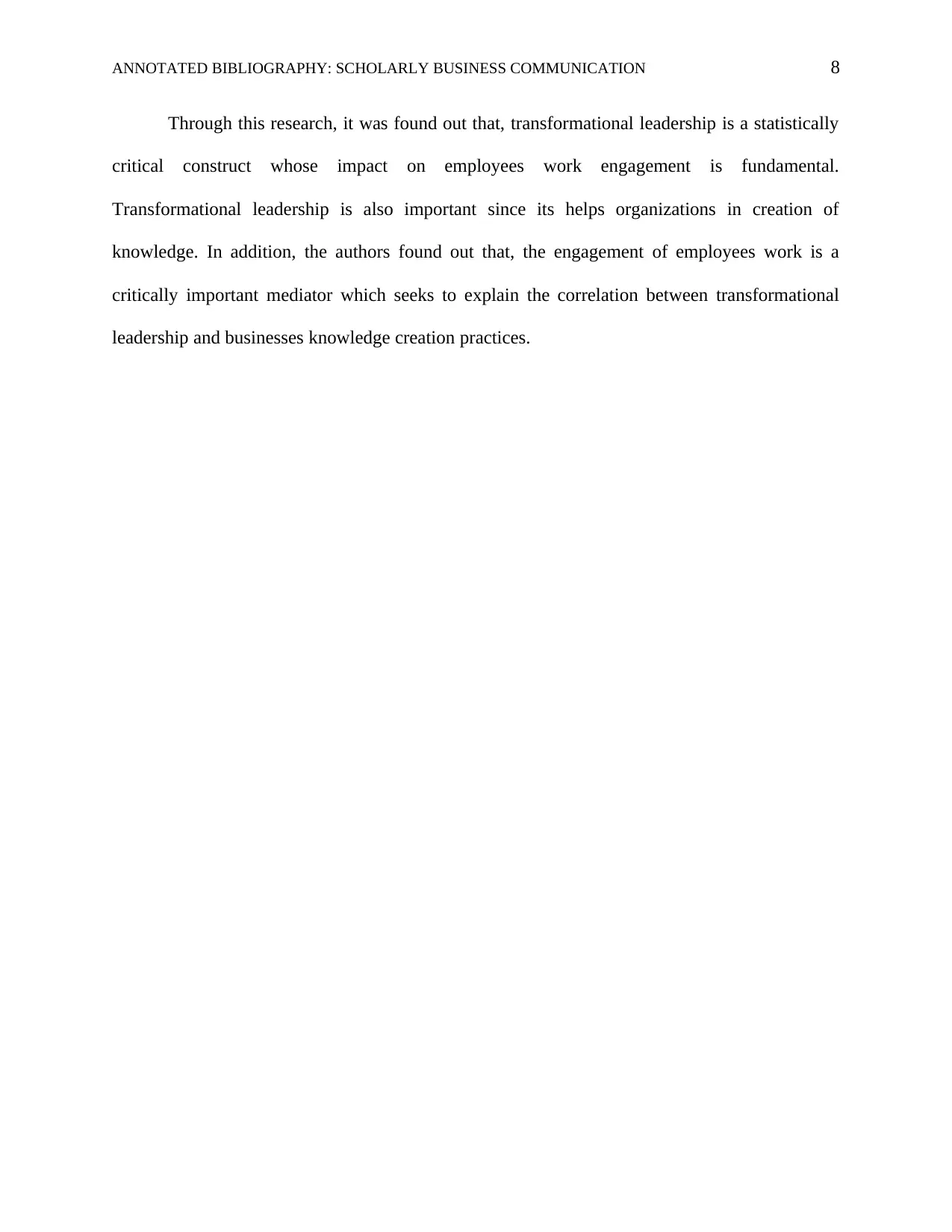
ANNOTATED BIBLIOGRAPHY: SCHOLARLY BUSINESS COMMUNICATION 8
Through this research, it was found out that, transformational leadership is a statistically
critical construct whose impact on employees work engagement is fundamental.
Transformational leadership is also important since its helps organizations in creation of
knowledge. In addition, the authors found out that, the engagement of employees work is a
critically important mediator which seeks to explain the correlation between transformational
leadership and businesses knowledge creation practices.
Through this research, it was found out that, transformational leadership is a statistically
critical construct whose impact on employees work engagement is fundamental.
Transformational leadership is also important since its helps organizations in creation of
knowledge. In addition, the authors found out that, the engagement of employees work is a
critically important mediator which seeks to explain the correlation between transformational
leadership and businesses knowledge creation practices.
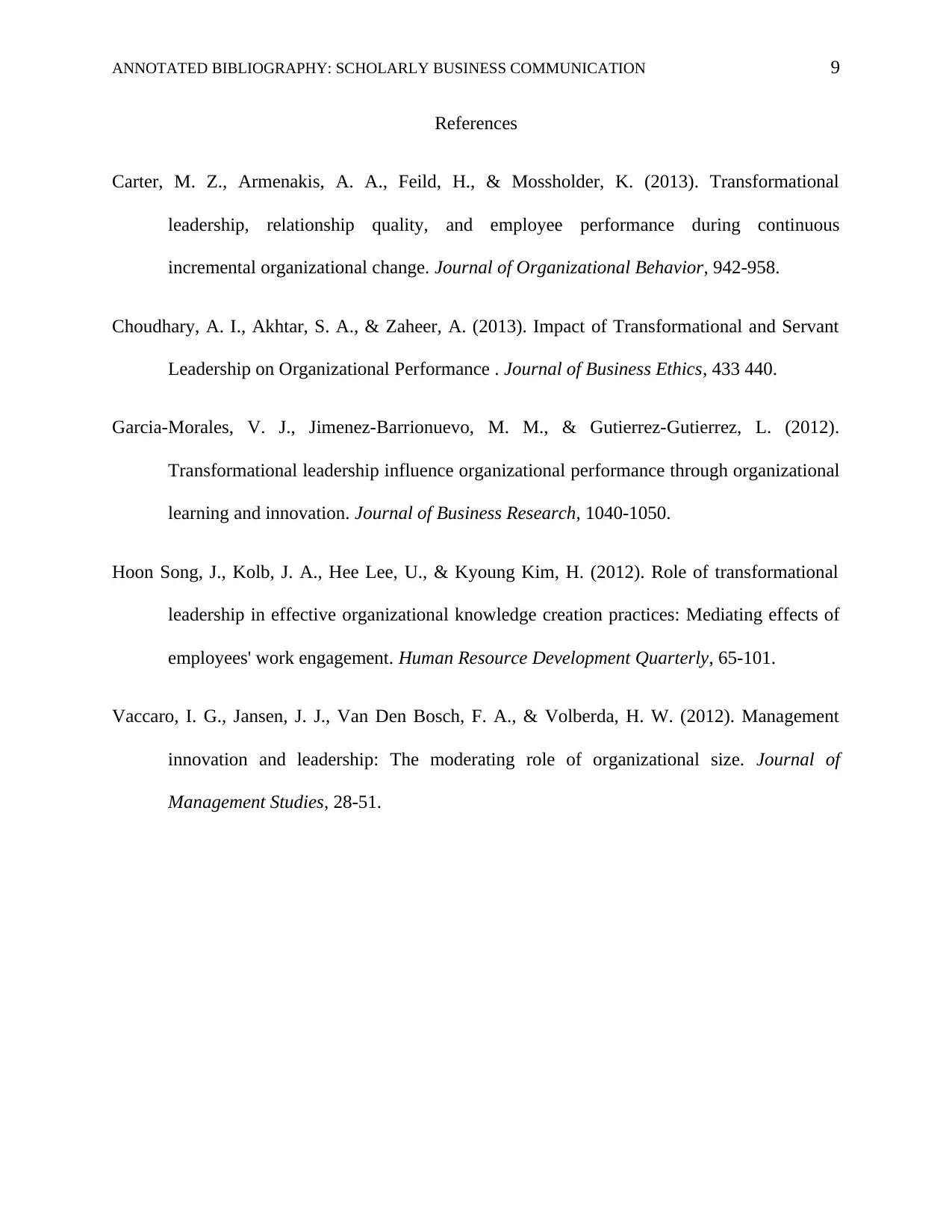
ANNOTATED BIBLIOGRAPHY: SCHOLARLY BUSINESS COMMUNICATION 9
References
Carter, M. Z., Armenakis, A. A., Feild, H., & Mossholder, K. (2013). Transformational
leadership, relationship quality, and employee performance during continuous
incremental organizational change. Journal of Organizational Behavior, 942-958.
Choudhary, A. I., Akhtar, S. A., & Zaheer, A. (2013). Impact of Transformational and Servant
Leadership on Organizational Performance . Journal of Business Ethics, 433 440.
Garcia-Morales, V. J., Jimenez-Barrionuevo, M. M., & Gutierrez-Gutierrez, L. (2012).
Transformational leadership influence organizational performance through organizational
learning and innovation. Journal of Business Research, 1040-1050.
Hoon Song, J., Kolb, J. A., Hee Lee, U., & Kyoung Kim, H. (2012). Role of transformational
leadership in effective organizational knowledge creation practices: Mediating effects of
employees' work engagement. Human Resource Development Quarterly, 65-101.
Vaccaro, I. G., Jansen, J. J., Van Den Bosch, F. A., & Volberda, H. W. (2012). Management
innovation and leadership: The moderating role of organizational size. Journal of
Management Studies, 28-51.
References
Carter, M. Z., Armenakis, A. A., Feild, H., & Mossholder, K. (2013). Transformational
leadership, relationship quality, and employee performance during continuous
incremental organizational change. Journal of Organizational Behavior, 942-958.
Choudhary, A. I., Akhtar, S. A., & Zaheer, A. (2013). Impact of Transformational and Servant
Leadership on Organizational Performance . Journal of Business Ethics, 433 440.
Garcia-Morales, V. J., Jimenez-Barrionuevo, M. M., & Gutierrez-Gutierrez, L. (2012).
Transformational leadership influence organizational performance through organizational
learning and innovation. Journal of Business Research, 1040-1050.
Hoon Song, J., Kolb, J. A., Hee Lee, U., & Kyoung Kim, H. (2012). Role of transformational
leadership in effective organizational knowledge creation practices: Mediating effects of
employees' work engagement. Human Resource Development Quarterly, 65-101.
Vaccaro, I. G., Jansen, J. J., Van Den Bosch, F. A., & Volberda, H. W. (2012). Management
innovation and leadership: The moderating role of organizational size. Journal of
Management Studies, 28-51.
⊘ This is a preview!⊘
Do you want full access?
Subscribe today to unlock all pages.

Trusted by 1+ million students worldwide
1 out of 9
Related Documents
Your All-in-One AI-Powered Toolkit for Academic Success.
+13062052269
info@desklib.com
Available 24*7 on WhatsApp / Email
![[object Object]](/_next/static/media/star-bottom.7253800d.svg)
Unlock your academic potential
Copyright © 2020–2026 A2Z Services. All Rights Reserved. Developed and managed by ZUCOL.





